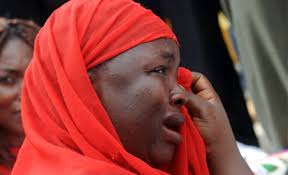Last week, at Falomo Roundabout in Lagos, my car was almost hit by a dirty Danfo bus. As I expertly dodged the ochre-and-black stripes commuter bus, my gaze was drawn to a large group of photographs which surrounded the traffic circle like sentries. Numbering a hundred or more, they depicted a face with a red question mark at its centre, and a name at its base. The names were those of the almost 300 female students abducted by Boko Haram in April from a school in Chibok, Borno State.
Of course, I was not seeing them or the numerous reminders of the girls for the first time, but as days became weeks and weeks months, still no news of their return, thoughts of the girls were gradually upstaged by unavoidable daily wahala.
That rainy day, as I circumvented the pool of muddy water at the roundabout, I was consumed by a blend of several emotions least of which was disgust that I had given up hope.
I felt angry, as I recalled the events of these past months. Bewildered, that the military had 4 hours advance warning of the abductions yet failed to send reinforcements to protect the school. Stunned, at news that the girls had been sighted deep inside a nearby forest, but the military decided against infiltrating it “for fear of putting their lives at risk”. Nonsense! Astounded, as I waited in vain for news of the successful infiltration of the forest and the rescue of the girls. Alas, I daydreamed!
It has been 198 days, about 50 of the girls have escaped miraculously from their abductors. Stories of their ordeal ranging from being used as sex slaves to being killed for refusal to convert from Christianity to Islam have emerged.
Amid rumours of the rest of the girls having been taken outside the country and sold off, some believe that there were no abductions in the first place. Others believe that there were abductions, carried out by Boko Haram, at the behest of some Ogas at the top. The latter support their claim by predicting that the girls should be released before the elections in 2015. Presently, negotiations are on-going between the government and Boko Haram. The release of the girls in exchange for some of their captured members, is said to be in the offing.
There is an Igbo proverb which says “Ekwe onye nchiche n'aka, o'choba ibi-oma”. Meaning, “Offer a leper a handshake, and he will demand an embrace”. I am absolutely elated at news of the impending return of the girls, but also wary as Boko Haram`s insidious strategy becomes apparent.
Nevertheless, the Nigerian political class is in a quandary, no matter who wins the 2015 presidential elections; damned if the girls are released before the elections (culpability of the ruling PDP government?); damned if they are released after the elections by the new APC government (culpability of the APC?).
It has been 198 days. Bring back our girls.

Of course, I was not seeing them or the numerous reminders of the girls for the first time, but as days became weeks and weeks months, still no news of their return, thoughts of the girls were gradually upstaged by unavoidable daily wahala.
That rainy day, as I circumvented the pool of muddy water at the roundabout, I was consumed by a blend of several emotions least of which was disgust that I had given up hope.
I felt angry, as I recalled the events of these past months. Bewildered, that the military had 4 hours advance warning of the abductions yet failed to send reinforcements to protect the school. Stunned, at news that the girls had been sighted deep inside a nearby forest, but the military decided against infiltrating it “for fear of putting their lives at risk”. Nonsense! Astounded, as I waited in vain for news of the successful infiltration of the forest and the rescue of the girls. Alas, I daydreamed!
It has been 198 days, about 50 of the girls have escaped miraculously from their abductors. Stories of their ordeal ranging from being used as sex slaves to being killed for refusal to convert from Christianity to Islam have emerged.
Amid rumours of the rest of the girls having been taken outside the country and sold off, some believe that there were no abductions in the first place. Others believe that there were abductions, carried out by Boko Haram, at the behest of some Ogas at the top. The latter support their claim by predicting that the girls should be released before the elections in 2015. Presently, negotiations are on-going between the government and Boko Haram. The release of the girls in exchange for some of their captured members, is said to be in the offing.
There is an Igbo proverb which says “Ekwe onye nchiche n'aka, o'choba ibi-oma”. Meaning, “Offer a leper a handshake, and he will demand an embrace”. I am absolutely elated at news of the impending return of the girls, but also wary as Boko Haram`s insidious strategy becomes apparent.
Nevertheless, the Nigerian political class is in a quandary, no matter who wins the 2015 presidential elections; damned if the girls are released before the elections (culpability of the ruling PDP government?); damned if they are released after the elections by the new APC government (culpability of the APC?).
It has been 198 days. Bring back our girls.




